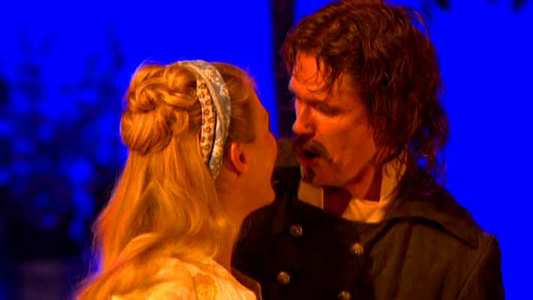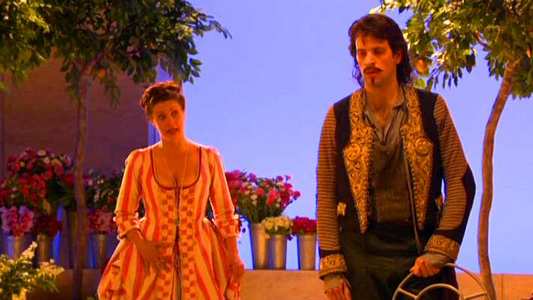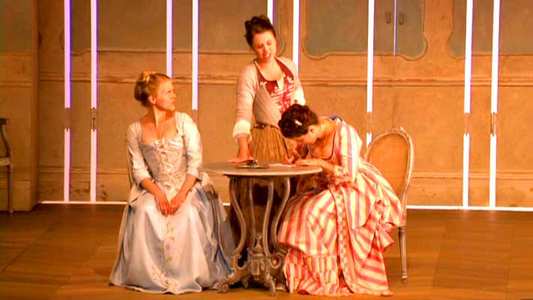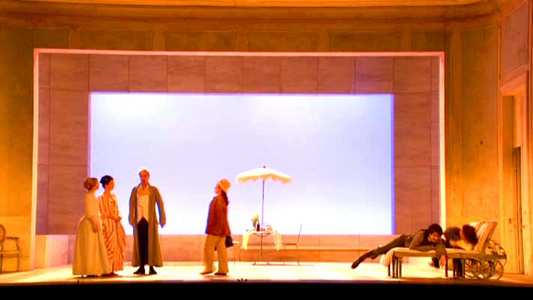Mozart: Cosi Fan Tutte (Fischer)
Introduction
A performance of Mozart`s late opera, filmed over 2 nights at Glyndebourne in 2006.
Ferrando and Guglielmo, two army officers, are arguing with their friend Don Alfonso, who insists that despite being madly in love with their fiancées, and indeed their fiancées being madly in love with them, it wouldn`t take much to get the girls to become unfaithful, as all women are like that really. Understandably aggrieved by this suggestion, a bet is made, and the soldiers agree to follow Alfonso`s instructions to the letter as he strives to prove that even the `paragons of fidelity` spoken so highly of can be turned within a day.
Using the pretence of some war breaking out, Ferrando and Guglielmo are shipped off, accompanied by the expected tears and hand-wringing from their loved ones, sisters Dorabella and Fiordiligi. The maid Despina, who is roped into the scam by Alfonso, pretends to be sympathetic, but insists that, as soldiers, they`ll be playing the field as soon as they can, and the girls should do the same by finding new lovers as soon as they can.
Almost straight away, two strangers appear (apparently Albanian, with impressive facial hair). They are, of course, really Ferrando and Guglielmo, and are greeted as old friends by Don Alfonso. Dorabella and Fiordiligi are shocked by the intrusion, and even more shocked by the obvious amorous advances of the strangers. After they storm off, Ferrando and Guglielmo are delighted they seem to have won the bet, but Alfonso has none of it. There`s plenty of time left.
The `Albanians` rush into where the girls are and, apparently distraught at the rejection, poison themselves. Alfonso and Despina tell Dorabella and Fiordiligi to show some compassion before running off to find help. Help turns up rather quickly, as Despina desguised as a doctor. She miraculoualy `cures` the two men using the latest Mesmeric treatment which basically involves a large magnet.
Alfonso and Despina tell Dorabella and Fiordiligi that as the men tried to kill themselves for love, a little flirting wouldn`t go amiss. Funnily enough, the two girls have already entertained this thought, and choose which of the Albanians they prefer. As luck would have it, each goes for the `wrong` man.
The couples go for a stroll in the gardens, and Dorabella quickly succumbs to Guglielmo`s charm, even giving up Ferrando`s portrait she has kept in a locket. Fiordiligi however, isn`t playing ball, and no amount of cajoling from Ferrando will force her to change her mind.
When the lads get together to compare notes, Ferrando is not surprisingly upset to learn of his friend`s success, but despite all that, he still loves Dorabella, and Guglielmo now agrees with Alfonso`s initial statement about women.
Dorabella, meanwhile, is quite happy about what she`s done and tries to persuade Fiordiligi that she should really give in. Fiordiligi, however, has decided to leave and join Guglielmo on the battlefield (once she finds out where this battle is taking place). Ferrando bursts in, and this time Fiordiligi is won over. Guglielmo is watching from the sidelines and realises that Alfonso has won. Alfonso tells the men that the best way to get revenge is to marry each other`s partner, so a wedding is organised straight away. A notary is fetched (Despina again), and the vows and contracts are dealt with quickly.
As soon as the signing is done, a commotion is heard and the sisters realise that their lovers are returning. The Albanians run off just before Ferrando and Guglielmo reappear. Expecting to be welcomed with open arms, they`re a bit concerned by the less-than-warm reception facing them now. The `notary` is discovered (and revealed as Despina), together with the marriage contracts. Dorabella and Fiordiligi admit their guilt, and Alfonso, Ferrando and Guglielmo run off to find the Albanians, returning shortly afterwards partially disguised, revealing their own somewhat dubious part in the action. Alfonso himself admits that it was all his idea in the first place, and that everyone should laugh it off. Remorse and forgiveness all round!...but at a cost.

Video
No complaints at all here, as video quality on this NTSC disc is excellent. This is another in Opus-Arte`s high-def recordings, but not having a HD TV I can`t comment on whether this has much effect. I was also impressed by the beautiful natural light effects (brought across excellently on disc) created in the theatre by Paule Constable.

Audio
Sound is as clear as you would want it. The DTS option is very nicely balanced, and although there`s not much in the way of sounds that need multi-speaker positions, it was good to hear some of the orchestral parts appearing in the correct bit of the room.

Features
Extras consist of some interesting, but again, all-too-brief, interviews from the director, conductor and all the cast, together with an illustrated synopsis and a rather more animated cast gallery than I am used to in Opus-Arte releases, which was quite a pleasant surprise.

Conclusion
Cosi has often been regarded as the `poor relation` when it comes to the Da Ponte operas, and this wasn`t helped by heavyweights such as Beethoven and Wagner treating it with barely disguised contempt themselves. It was also the last major Mozart opera I got to know myself, when I ended up playing it in several pits in British Youth Opera productions 15 years or so ago. It fast became a favourite, not just because of the consistent inventiveness in the music, but also because of the plot and libretto, which could easily be seen as lacking the `weight` of Figaro or Giovanni, but in the right hands can be a comedic triumph.
It is also an opera which can easily be turned completely upside down by a director who tries to be too clever in `updating` things to show that there is some contemporary relevance, however vague. Calixto Bieito`s production for WNO which I saw a few years ago is a case in point. He turned the whole thing into a low-class, vulgar sexual romp (and having everyone performing the Macarena in the last number!). We also have the famous Peter Sellers production set in and around `Despina`s Diner` somewhere in the mid-West (although I did quite enjoy that one).
Luckily, this Glyndebourne performance hits all the right notes (ho ho) in direction. Nicholas Hytner has gone for an unashamedly (or `shockingly`, as the blurb puts it) traditional approach, which means there is no deep and philosophical thinking needed by the audience as to what the hell is going on. The characters presented to us are thoroughly believeable (in the context of the main conceit of the story of course), and the cast (all young, good-looking singers) create a tangible sexual electricity between each other.
The whole thing is very smartly moved along by Iván Fischer, who seems (in the most part) to have hit upon the perfect tempi for everyone to be comfortable with their roles, although in the second act, I felt some arias were a bit too leisurely (Fiordiligi`s Rondo, especially). The Orchestra of the Age of Enlightenment (led by Margaret Faultless - who probably gets some stick every time she slips up) play superbly throughout, and are a persuasive argument for `original` instrument performances, despite the French Horn sound being slightly too `present`.
As for the singing, I really have no complaints to make at all. The cast was completely unknown to me before watching this disc, but I suspect will be seen more often very soon.
Anke Vondung (Dorabella) and Miah Persson (Fiordiligi) are perfect as the sisters, each starting out as rocks of fidelity, but quickly dissolving into shameless flirts without making things even more unbelievable. Persson (who has some particularly difficult music) carries off her role especially well, and when she finally gives in to Ferrando, creates a very moving and dramatic moment, often missing from this work.
Topi Lehtipuu (Ferrando) and Luca Pisaroni (Guglielmo) both sing strongly, with Pisaroni producing a particularly fine `Un`aura amorosa` . Again, the characterisations are superb, and both men produce some very moving and very funny moments.
Ainhoa Garmendia (Despina) gives a very jolly performance, and is particularly good at throwing off the complicated recitatives, making them sound like believeable conversation (quite an easy thing to fall over on) and Nicolas Rivenq (Don Alfonso), although slightly less sly than I like in this role, is satisfyingly smug with a nice, powerful voice, but for some reason, doesn`t quite hold the same stage presence as everyone else, probably due to the rather fine acting from the other characters, and for a pivotal role is a little disappointing.
To have yet another Cosi on DVD may be seen as a risky venture, but this performance really has to go to top of the list for anyone who likes their opera without the excesses of over-zealous directors. The performances are as near as perfect as I can imagine, the acting is great and produces some real laugh-out-loud reactions (except for the ONE line which should - a comment made about the shrubberies containing more leaves than fruit. At least we got a laugh in BYO for that one), and the quality of the sound and picture is of demonstration standard.
But the highlight is obviously Mozart`s music, which tells you a lot more about the characters and their feelings than the rather stereotyped plot-devices allow. If you`re not familiar with this opera (and I`m sure there are a few out there who believe everything they hear or read), you won`t be disappointed and I challenge anyone not to come away from this without feeling as if they have experienced something special.
Definitely one for my discs of the year.
Your Opinions and Comments
Be the first to post a comment!